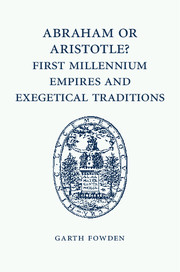 Abraham or Aristotle? First Millennium Empires and Exegetical Traditions
Abraham or Aristotle? First Millennium Empires and Exegetical Traditions Abraham or aristotle? first millennium empires and exegetical traditions: An Inaugural Lecture
Published online by Cambridge University Press: 05 October 2015
Summary
Your Excellency the Ambassador of the Sultanate of Oman, Ladies and Gentlemen,
Sultan Qaboos in England
His Majesty Sultan Qaboos bin Said of Oman I have not yet had the honour of meeting in person. When at the age of twenty he was an officer cadet at Sandhurst, I as a boy was haunting the woods and lakes of the Royal Military Academy – I lived a mile away. My first book, published when I was thirteen, was a history of St Michael's parish church, Sandhurst – a pamphlet, largely plagiarized. During his stay in England, from 1958 onward, the Sultan-to-be also learnt to play the ecclesiastical organ, and remains an enthusiast for this instrument. When, aged seventeen, I went to work for a year at St George's School in Jerusalem, I used to play the Anglican cathedral organ for school services – a wheezy old instrument that had never quite recovered from being hit by a shell in 1948. I flatter myself that when we do meet, the Sultan and I will discover a few common threads in our lives connected to youthful travels in search of wider horizons, he in England and Europe and I in the Arab world. It was during a year's sojourn in Jerusalem in 1970 to 1971, in the churches of the Old City and the monasteries of the Judean wilderness, during long afternoons spent wandering on the Ḥaram al-Sharīf or sipping tea with yeshiva students, that I began to learn about Eastern Christianity, Islam and Judaism; and through the Sultan's vision and munificence I am now permitted to share my experiences and thoughts with you.
Sultan Qaboos and the ‘Abrahamic faiths’
Sultan Qaboos is renowned for his cultural and intellectual broadmindedness, so I doubt he will take it amiss if I engage a little with the title of the Chair of Abrahamic Faiths and Shared Values we are today inaugurating.
- Type
- Chapter
- Information
- Abraham or Aristotle? First Millennium Empires and Exegetical TraditionsAn Inaugural Lecture by the Sultan Qaboos Professor of Abrahamic Faiths Given in the University of Cambridge, 4 December 2013, pp. 1 - 43Publisher: Cambridge University PressPrint publication year: 2015
